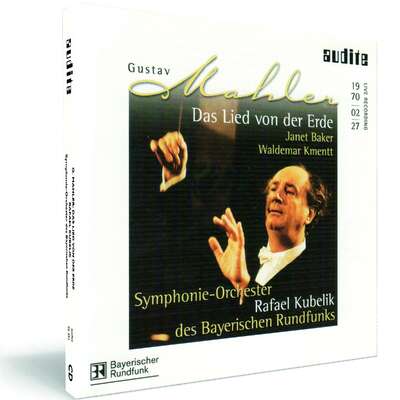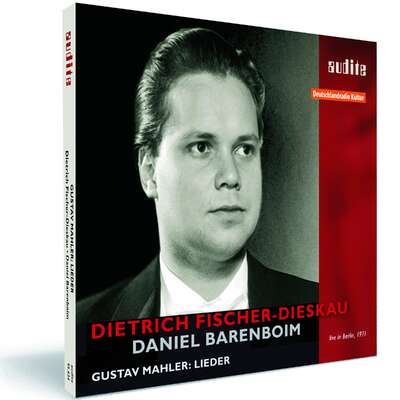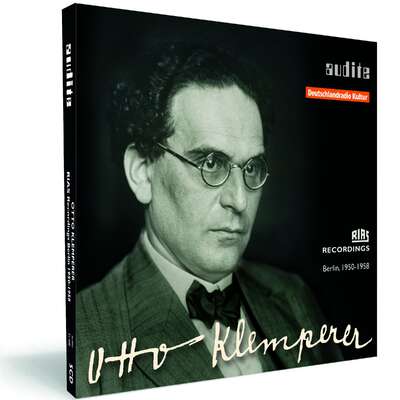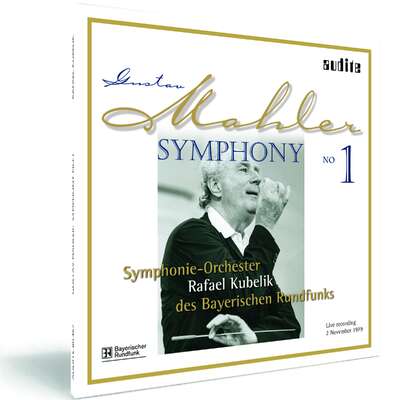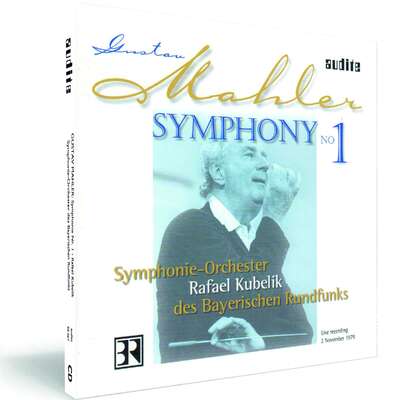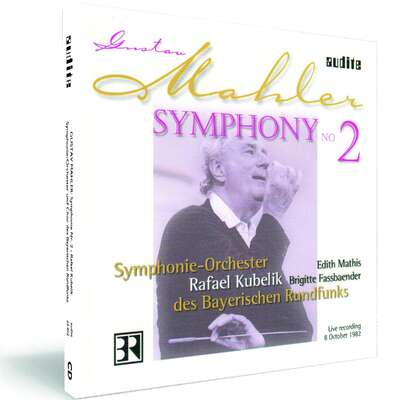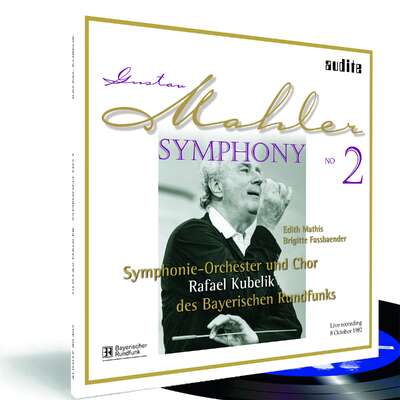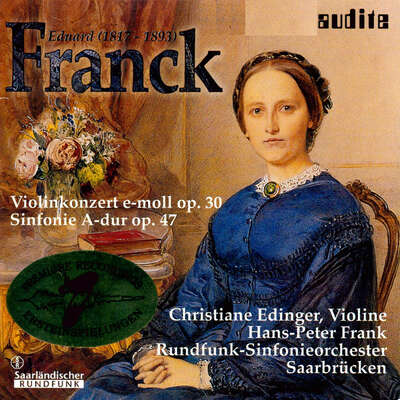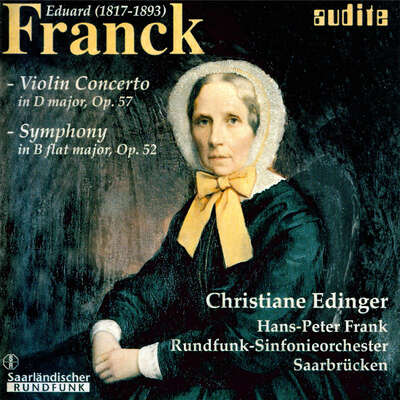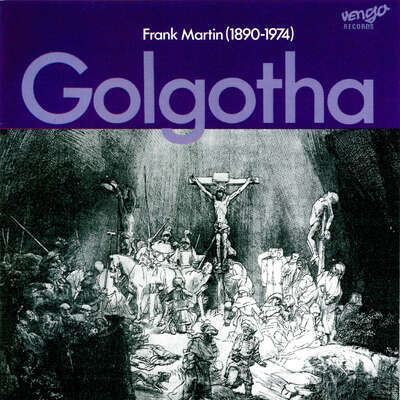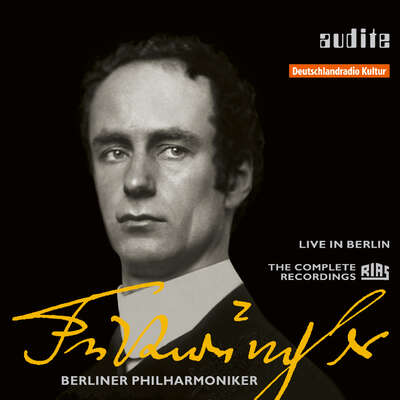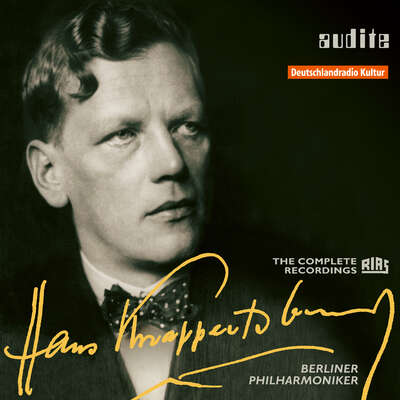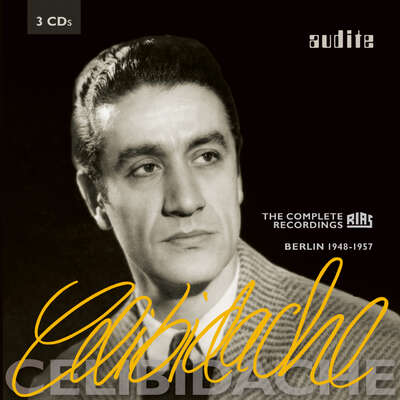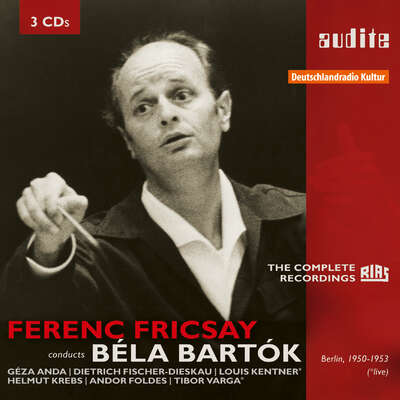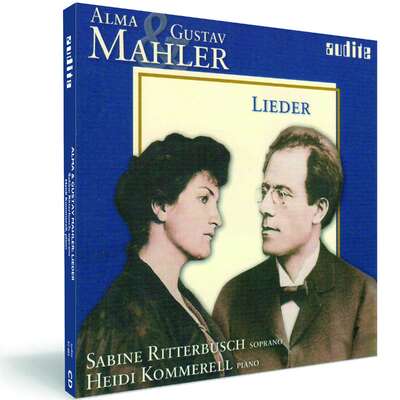
Die Sinfonie Nr. 8 ist Mahlers monumentalste, ist sie doch die Kombination zweier Chorkantaten gewaltigen Zuschnitts: Mahler verbindet den alten Pfingsthymnus von Hrabanus Maurus „Veni, creator spiritus“ mit dem Schlussabschnitt des „Chorus mysticus“ von Goethes Faust II. Unterschiedlicher...mehr
Symphonieorchester des Bayerischen Rundfunks | Chor des Norddeutschen Rundfunks | Chor des Westdeutschen Rundfunks | Regensburger Domspatzen | Münchner MotettenChor
Rafael Kubelik
"Und so hört man auf dieser Platte eine der zügigsten, lebendigsten pulsierendsten und kontrastreichsten Interpretationen dieser Symphonie, die ich kenne." (Pizzicato)
Details
|
Gustav Mahler: Symphony No. 8
live recording of 24 June 1970 |
|
| Artikelnummer: | 92.551 |
|---|---|
| EAN-Code: | 4022143925510 |
| Preisgruppe: | ACX |
| Veröffentlichungsdatum: | 1. Januar 2005 |
| Spielzeit: | 73 min. |
Zusatzmaterial
- "Listen & Compare" in Fono Forum 2/2005
- Portrait Franz Crass in Fono Forum 3/1962
- Portrait Rafael Kubelik in Fono Forum 6/1965
- Große Interpreten der Schallplatte: Dietrich Fischer-Dieskau - ein Sänger unserer Zeit (Fono Forum 7/8/1957)
- Portrait Dietrich Fischer-Dieskau in Fono Forum 6/1959
- Rafael Kubelik auf der Titelseite von Fono Forum 7/1963
- Edith Mathis auf der Titelseite von Fono Forum 6/1963
- Portrait Martina Arroyo in Fono Forum 3/1970
- Rezension in "CD maniac, classic 100CD"
Informationen
Die Sinfonie Nr. 8 ist Mahlers monumentalste, ist sie doch die Kombination zweier Chorkantaten gewaltigen Zuschnitts: Mahler verbindet den alten Pfingsthymnus von Hrabanus Maurus „Veni, creator spiritus“ mit dem Schlussabschnitt des „Chorus mysticus“ von Goethes Faust II. Unterschiedlicher könnten die Texte kaum sein und so stellt auch die Musik den Hörer vor höchst unterschiedliche Anforderungen: Der erste Teil der Sinfonie ist in sich geschlossen, die ekstatische Begeisterung des Hymnus wechselt mit innigen Passagen, um am Schluss den Bogen zum hymnischen Anfangscharakter zu schlagen. Der zweite Teil zur Vertonung des Faust-Textes ist nicht nur zweieinhalbmal so lang wie der erste Teil, sondern auch ungleich komplexer. Goethes esoterische Dichtung lässt auch Mahler in immer höhere Sphären aufsteigen; dennoch wird seine Musik fast immer den Worten Goethes und der szenischen Beschreibung gerecht und Mahlers überirdische Visionen manifestieren sich in diesem gewaltigen Werk. Die Besetzung von einem 8-stimmigen Doppelchor, einem Knabenchor, 8 Solisten und der üppigen Orchesterbesetzung samt Orgel trugen der Sinfonie vor der Uraufführung den Beinamen „Sinfonie der Tausend“ ein. Auch wenn Mahler auf der Streichung dieses Untertitels auf dem Werbeplakat bestand, drückt sich darin doch das Monumentale des Werkes gut aus.
Die Live-Aufnahme vom 24. Juni 1970 aus dem Kongreßsaal des Deutschen Museums mit Rafael Kubelik und dem Symphonie-Orchester des Bayerischen Rundfunks erscheint im SACD Format. Sie ist die Fortsetzung unserer Reihe „LISTEN & COMPARE“, die dem SACD-Hörer neben der überarbeiteten Fassung auch die völlig ursprünglich belassene Archivaufnahme zum direkten Vergleich anbietet.
Besprechungen
www.musicweb-international.com | September 2006 | Anne Ozorio | 22. September 2006
Conceivably, many people own the Kubelik set of Mahler symphonies on DG. But being a live performance, and in remastered sound, this is still anMehr lesen
This recording also benefits from an excellent set of soloists, whose voices are clearly differentiated: an important consideration in a symphony where the singers so often sing in a group, and where clarity helps bring out the interplay of individual voices. It is also live, as most recordings of this massive symphony are, given the logistics of putting together any performance. If you’ve got the “thousand” performers together, tape them for the moment may never come again! More seriously, a symphony like this is an event in itself, and an experience so unique that it generates its own atmosphere. The sheer dynamic of coordinating such vast numbers creates a sense of occasion which further inspires the performers to give their best. Even performances where there are elements not quite up to scratch retain this feeling of immediacy. If ever there was a symphony that needs to be listened to for total impact, this is it. It’s churlish, I think, to expect utter perfection at all times, especially given the size of the forces involved. After all, the text is about the redemption of Faust and his being accepted into Heaven despite having sinned. Love transcends death, and redeems the flawed soul. Miss that, and you miss a fundamental aspect of Mahler’s entire outlook on life, replicated in different forms in the Second, the Fourth, the Ninth and Das Lied von der Erde, if not more subtly elsewhere.
The main minus with this reissue, particularly for newcomers, is the poor booklet notes. On the other hand, that’s no disqualification. Listen with your ears and soul, don’t bury your nose in the booklet. Then, learn all you can from other sources and recordings.
The opening movement, Veni, creator spiritus is particularly animated. With a powerful surge of the great organ, the symphony gets off the ground, soloists and choruses right on the mark. From an almost silent background, individual soloists rise, their voices weaving and blending together. The soloists are well chosen, as each voice is so distinctive it’s easy to track them: there’s no mistaking Fischer-Dieskau, for example, though his lines are less spectacular, perhaps, than those of the sopranos. Kubelik’s characteristic light touch is persuasive in the non vocal passages. It mirrors the surprising delicacy of the vocal writing. Other conductors can get away with darker textures, perhaps because their singers aren’t as transcendently clear as Kubelik’s.
Even the rather over-bright recording has its merits, adding to the sense of heightened spiritual illumination. This isn’t reality, it’s technicolour Heaven, where various manifestations of the Virgin Mary, Gretchen, Faust and other symbolic figures sing, watched, presumably by anchorites in caves - as described in Goethe’s original text.
Kubelik bathes the next movement with similar light. Behind the songs of the contraltos and Magna peccatrix, for example, you can hear details like plucked strings and harp. Overall, the singing is good, despite occasional strained notes pitched too ambitiously. In the penultimate chorus, the brass repeats the notes behind the words “Blicket auf !” and the sounds fade away, as if dissolving into space. Then, led by the Chorus mysticus and sopranos, themes from Veni, creator spiritus return rousingly, and in full force. Redeemed by love, Faust is transmuted into eternity and taken into Heaven . “Das Ewig-Weibliche zieht uns hinan”.
www.allmusic.com | 01.12.2005 | Blair Sanderson | 1. Dezember 2005
Rafael Kubelik made this live recording of Gustav Mahler's Symphony No. 8Mehr lesen
www.SA-CD.net | August 26, 2005 | Mark Wagner | 6. August 2005
Hmmmmm.....<br /> <br /> First, I will say that I have never heard a recording orMehr lesen
First, I will say that I have never heard a recording or
www.ionarts.org | Friday, July 08, 2005 | 8. Juli 2005 Live Recordings of Mahler's Eighth
Speaking of such a performance, Rafael Kubelik's 8th on Audite was alsoMehr lesen
Scherzo | n°199 (julio-agosto 2005) | Enrique Pérez Adrián | 1. Juli 2005 Tres mil
Tres nuevas versiones de la Octava de Mahler se añaden a la discografíaMehr lesen
www.SA-CD.net | June 9, 2005 | Oscar Gil | 9. Juni 2005
Kubelik is one of the truly great Mahler conductors. He focuses on the moreMehr lesen
Le Monde de la Musique | Juin 2005 | Patrick Szersnovicz | 1. Juni 2005
Œuvre « officielle » chantant la joie de créer, vocale d'un bout à l'autre, la Huitième Symphonie « des Mille » (1906) est gagnée parMehr lesen
Si toute interprétation doit venir en aide à l'insuffisance des œuvres, la Huitième Symphonie requiert une interprétation parfaite. Enregistré « live » le 24 juin 1970 à Munich, à la tête d'un orchestre et de chanteurs exemplaires, Rafael Kubelik offre une vision puissante, « moderniste » et très proche de sa – magnifique – version officielle réalisée pour DG à la même époque. Si l'on demeure assez loin de l'exaltation d'un Bernstein ou de l'enthousiasme d'un Ozawa, l'équilibre et la rapidité des tempos, l'absence de pathos donnent la priorité au tissu musical. Le chef souligne dans le « Veni Creator » tout l'acquis des symphonies instrumentales précédentes et évite, dans la « Scène de Faust », l'écueil d'une simple succession d'airs et de chœurs. La prise de son, malgré l'excellence du report, n'est pas parfaite, mais la qualité des solistes vocaux est unique dans la discographie.
Classica-Répertoire | Juin 2005 | Stéphane Friédérich | 1. Juni 2005
Audite poursuit son intégrale live des symphonies de Mahler en nousMehr lesen
www.ClassicsToday.com | May 2005 | David Hurwitz | 1. Mai 2005
This live Mahler Symphony No. 8, made the same month as Rafael Kubelik'sMehr lesen
www.classicstodayfrance.com | Mai 2005 | Christophe Huss | 1. Mai 2005
Quel incroyable contraste avec la version Nagano qui paraît en mêmeMehr lesen
Diapason | Mai 2005 | Jean-Charles Hoffele | 1. Mai 2005
Ce n'est pas la relative méforme de Norma Procter qui fragilisera le geste épique de Kubelik dans ce concert inédit, enregistré en même temps queMehr lesen
La Seconde scène de Faust est ici un opéra : les chanteurs incarnent les personnages idéaux voulus par Goethe avec un sens dramatique que certains trouveront trop prononcé. Lorsqu'on entend la coda soulevée par Kubelik, galvanisée, on comprend que la 8e est une symphonie sans ombre, un chant du cosmos radieux avec l'être humain en son centre. Elle célèbre les noces de la vie et de l'univers avant que ne revienne le peuple de fantômes qui n'a presque jamais quitté le compositeur.
Muzyka21 | maj 2005 | Michał Szulakowski | 1. Mai 2005
„Wszystkie moje wcześniejsze symfonie były tylko preludium do tejMehr lesen
klassik.com | April 2005 | Miquel Cabruja | 18. April 2005 | Quelle: http://magazin.k... Mehrkanaligkeit
In immer kürzeren Abständen wirft die Musikindustrie neue Formate auf denMehr lesen
Pizzicato | 3/2005 | Rémy Franck | 1. März 2005
Am 25. & 26. Juni 1970 nahm Rafael Kubelik die Achte Mahler im Studio für die Deutsche Grammophon auf. Am 24 Juni entstand mit demselbenMehr lesen
klassik-heute.com | Februar 2005 | Sixtus König | 8. Februar 2005
Die Aufführung von Gustav Mahlers achter Sinfonie im Juni 1970 bildeteMehr lesen
Wiener Zeitung | Samstag, 05. Februar 2005 | Edwin Baumgartner | 5. Februar 2005 Kubelik: Mahler-Symphonien 6, 7 und 8
Rafael Kubelik war der Prototyp des hochintelligenten und dabeiMehr lesen
El País
| 19.04.2003 | Javier Pérez Senz | 19. April 2003
Kubelik, en el corazón de Mahler
Dos sinfonías de Gustav Mahler grabadas en vivo abren la edición que el sello Audite dedica al director checo Rafael Kubelik, uno de los grandes mahlerianos de la historia.
[...] dirige el célebre adagietto con un encendido lirismo y una intensidad que hipnotiza al oyente –, situándose entre las mejores de la discografía.Mehr lesen


























